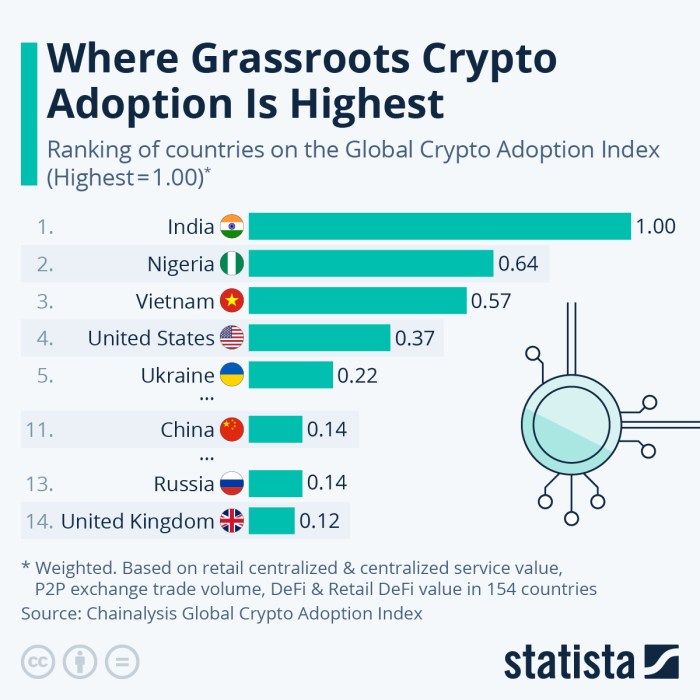The Challenges of Crypto Adoption in Developing Countries introduces the complexities and obstacles faced in embracing digital currencies, shedding light on the roadblocks hindering widespread adoption in these regions. As the world increasingly shifts towards a digital economy, understanding and overcoming these challenges becomes paramount for global financial inclusion.
Introduction to Crypto Adoption

Cryptocurrency adoption refers to the increasing use and acceptance of digital currencies as a medium of exchange in various transactions. It involves individuals, businesses, and even governments embracing cryptocurrencies for various purposes.
Some examples of popular cryptocurrencies include Bitcoin, Ethereum, and Ripple. These digital currencies have gained significant traction in the financial world and are widely used for investment, trading, and online purchases.
Benefits of Using Cryptocurrencies in Developing Countries
- Financial Inclusion: Cryptocurrencies provide access to financial services for individuals who are unbanked or underbanked, allowing them to participate in the global economy.
- Reduced Transaction Costs: Cryptocurrency transactions often have lower fees compared to traditional banking systems, making cross-border payments more affordable for individuals and businesses.
- Protection Against Inflation: In countries with unstable fiat currencies, cryptocurrencies can serve as a hedge against inflation, providing a more stable store of value for savings.
- Transparency and Security: Blockchain technology, which underpins cryptocurrencies, ensures transparency and security in transactions, reducing the risk of fraud and corruption.
Challenges Faced in Developing Countries: The Challenges Of Crypto Adoption In Developing Countries

In developing countries, the adoption of cryptocurrencies faces several challenges that hinder their widespread use and acceptance.
Economic Factors:
The economic conditions in developing countries play a significant role in the adoption of cryptocurrencies. Factors such as high levels of poverty, lack of access to banking services, and unstable local currencies can deter people from investing in or using cryptocurrencies as a form of payment or investment.
Regulatory Hurdles:
One of the major challenges faced in developing countries is the lack of clear regulations governing the use of cryptocurrencies. The uncertainty surrounding legal frameworks and the fear of potential bans or restrictions by governments can discourage businesses and individuals from embracing cryptocurrencies fully.
Economic Challenges, The Challenges of Crypto Adoption in Developing Countries
- Low financial literacy among the population leading to skepticism about cryptocurrencies.
- Lack of reliable internet infrastructure in rural areas hindering access to crypto exchanges.
- Volatility of cryptocurrencies impacting their use as a stable means of transaction.
Regulatory Hurdles
- Unclear or conflicting regulations on cryptocurrencies causing confusion and hesitancy.
- Fear of legal repercussions or crackdowns on crypto activities by authorities.
- Lack of investor protection laws making individuals hesitant to invest in cryptocurrencies.
Access to Technology and Internet

In the realm of crypto adoption, access to technology and the internet plays a crucial role in enabling individuals to participate in digital transactions and utilize cryptocurrencies for various purposes.
Disparities in Technology Infrastructure
Across developing countries, there exists a significant gap in technology infrastructure which hinders the widespread adoption of cryptocurrencies. While urban areas may have access to high-speed internet and advanced devices, rural regions often lack basic connectivity and equipment needed to engage in crypto transactions. This digital divide poses a challenge for individuals in remote areas who wish to leverage the benefits of crypto.
Initiatives Improving Access to Technology
Several initiatives have been implemented to address the issue of limited technology access in developing countries. For instance, organizations have introduced mobile-based crypto wallets that can be used even with basic smartphones and minimal data connectivity. Additionally, efforts to expand internet coverage to underserved regions are underway, aiming to bridge the technology gap and empower more individuals to participate in the crypto economy. These initiatives are essential steps towards fostering greater inclusivity and accessibility in the world of cryptocurrencies.
Financial Literacy and Education
Financial literacy plays a crucial role in promoting crypto adoption, especially in developing countries where access to traditional banking services may be limited. Understanding basic financial concepts and how cryptocurrencies work is essential for individuals to feel confident in using digital assets.
Educational Programs on Cryptocurrencies
In developing countries, there is a pressing need for educational programs focused on cryptocurrencies. These programs can help demystify the complexities surrounding digital currencies and empower individuals to make informed decisions about their financial futures. By providing accessible and comprehensive education on cryptocurrencies, more people can participate in the digital economy and benefit from the opportunities it offers.
- Organizations like the Blockchain Education Network (BEN) are working to enhance financial literacy in relation to crypto. BEN offers educational resources, workshops, and events to help individuals learn about blockchain technology and cryptocurrencies.
- The Crypto Currency Certification Consortium (C4) is another organization dedicated to promoting crypto education. C4 offers certifications for blockchain and cryptocurrency professionals, ensuring that individuals have the necessary knowledge and skills to navigate the crypto space.





